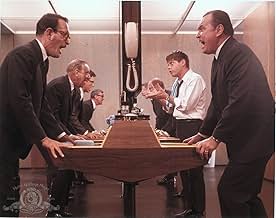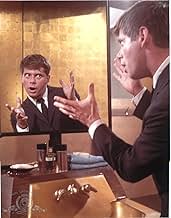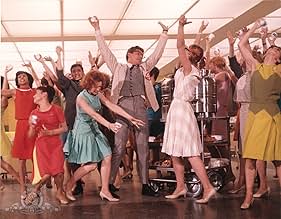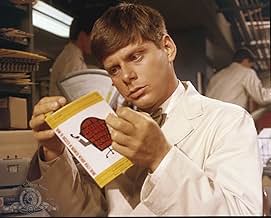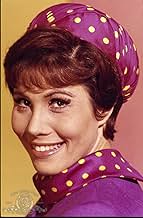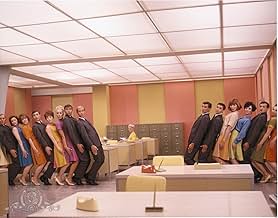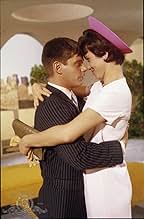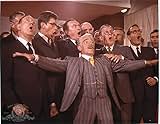Comment réussir dans les affaires sans vraiment essayer
Titre original : How to Succeed in Business Without Really Trying
- 1967
- Tous publics
- 2h 1min
NOTE IMDb
7,2/10
5,4 k
MA NOTE
J. Pierpont Finch laveur de vitre achète un livre décrivant comment réussir dans le monde des affaires. Il se met aussitôt à essayer les méthodes données...J. Pierpont Finch laveur de vitre achète un livre décrivant comment réussir dans le monde des affaires. Il se met aussitôt à essayer les méthodes données...J. Pierpont Finch laveur de vitre achète un livre décrivant comment réussir dans le monde des affaires. Il se met aussitôt à essayer les méthodes données...
- Réalisation
- Scénario
- Casting principal
- Récompenses
- 2 nominations au total
Anthony 'Scooter' Teague
- Bud Frump
- (as Anthony Teague)
Kathryn Reynolds
- Miss Smith aka Smitty
- (as Kay Reynolds)
Jeff DeBenning
- Gatch
- (as Jeff Debenning)
Avis à la une
One of the great satirical, musical comedies of the 60s. Robert Morse in the lead role is not unlike a sophisticated version of one of the Jerry Lewis characters of the same era - with the exception that he sings. And, he sings some wonderfully witty songs that must be very close to the bone in companies that take themselves too seriously. Sammy Smith is superb in his dual roles as the quarter of a century mail room head who "plays it the company way" and then later as Chairman Wally, the ex window washer. The lyrics will never date, along with the hammy caricatures of the self serving executives and staff. Not all stage musicals have translated well to the screen but How to Succeed is a noteworthy exception - highly recommended.
Today, at 77 years old, Robert Morse is still going strong as Mad Men's Cooper, but there's no question that his heyday was the late '50s to the early '70s, when his toothy grin, amiable tenor and boyish acting made him the toast of Broadway. Here, he repeats his Broadway success as J. Pierpont Finch in "How to Succeed In Business Without Really Trying," a 1967 film also starring Michele Lee, Rudy Vallee, and Anthony Teague. Lee and Vallee also repeat their Broadway roles.
With music and lyrics by Frank Loesser and book by Abe Burrows, "How to Succeed" is the story of window washer J. Pierpont Finch, who in a matter of days, thanks to a book he carries around by the same name as the film title, has risen through the ranks of the Worldwide Wicket Company without doing any work. He has his enemies, but one very good friend in Rosemary (Lee), a secretary with a crush on him who wants Ponty, as he is called, to make good.
I'm not all that familiar with the musical, but I understand that there are several songs missing, including "Happy to Keep His Dinner Warm." The standouts are "I Believe in You," which became a hit song, and the rousing "Brotherhood of Man." What makes the music for me is the wonderful orchestrations.
Sexist today in some of its themes, this is a brightly-colored musical, done the old-fashioned way, without cutting the numbers to pieces. Morse is delightful and never had any trouble adapting to film. Ditto a young, pretty Lee who sings "I Believe in You" like a dream. Vallee is well cast as the head of the company who has a girlfriend on the side. Anthony Teague is very good as the boss' nephew, but Charles Nelson Reilly played this role on stage, and I can only imagine how hilarious he was in the role.
Good movie, and director David Swift keeps the pace moving.
With music and lyrics by Frank Loesser and book by Abe Burrows, "How to Succeed" is the story of window washer J. Pierpont Finch, who in a matter of days, thanks to a book he carries around by the same name as the film title, has risen through the ranks of the Worldwide Wicket Company without doing any work. He has his enemies, but one very good friend in Rosemary (Lee), a secretary with a crush on him who wants Ponty, as he is called, to make good.
I'm not all that familiar with the musical, but I understand that there are several songs missing, including "Happy to Keep His Dinner Warm." The standouts are "I Believe in You," which became a hit song, and the rousing "Brotherhood of Man." What makes the music for me is the wonderful orchestrations.
Sexist today in some of its themes, this is a brightly-colored musical, done the old-fashioned way, without cutting the numbers to pieces. Morse is delightful and never had any trouble adapting to film. Ditto a young, pretty Lee who sings "I Believe in You" like a dream. Vallee is well cast as the head of the company who has a girlfriend on the side. Anthony Teague is very good as the boss' nephew, but Charles Nelson Reilly played this role on stage, and I can only imagine how hilarious he was in the role.
Good movie, and director David Swift keeps the pace moving.
What a great musical! Too bad only one song made the hit parade( I Believe in You) Michelle Lee's singing voice has the depth and range of Barbara Striesand....wish we could have heard more of it. Rudy Vallee was a gem...topped off a remarkable career --the Elvis of the 1920s! Get the DVD....it's a beautiful transfer!
This was one of the rare Broadway musicals whose book is actually more interesting than its score. So while roughly a half-dozen Frank Loesser songs from the stage version are deleted, they're not really missed. What survives is a witty skewering of office politics, featuring much of the Broadway cast. And while such '60s business staples as rampant sexism and smoking now look quaintly offensive, the gleeful satirizing of backstabbing and skulduggery in business will always be relevant. David Swift, whose training was in TV, doesn't do much with the widescreen format (except for the ingenious ballet-mechanique in "A Secretary Is Not a Toy"), but he cuts cleverly away from the production numbers just as the musical-comedy silliness is on the verge of becoming embarrassing, and he splices in some delectable location shots of '60s New York. The color scheme is bright, the pacing brisk, the cast friendly, the production values refreshingly modest. At a time in movie history when so many adaptations of stage hits were overbudgeted and overlong, what a pleasure to see something to faithful to its source material -- and so unpretentious.
I've lived in the Metropolitan New York area all my life but the first musical I ever saw was the revival of How to Succeed in Business with Matthew Broderick in the title role. This prompted me to purchase the original musical with Robert Morse and I was not disappointed. My wife preferred the live musical, however what attracted me to the video was the performance of Rudy Vallee as Mr Bigly. Frank Loesser's score is marvelous, I think that the song "The Company Way" is a humorous parody of those corporate types who risk nothing that will damage their careers. This video is one that I've watched over and over and I can recommend to any musical lovers other than ardent feminists who might be turned off by the 1960s type relationships between the men and women.
Le saviez-vous
- AnecdotesThe scene featuring Robert Morse skipping & dancing down the street on his way to work (immediately after the "Old Ivy" fight song duet with Rudy Vallee ) was filmed on location in New York City using hidden cameras and a small earpiece to cue Morse on his timing. The various amused & astonished passersby were not extras, but rather were New Yorkers reacting genuinely to someone dancing to his own tune. It may be noted that, in typical New York fashion, no matter how odd he appeared to be virtually none of the New Yorkers paid him any notice whatsoever.
- GaffesDuring opening credits number, Robert Morse and a young fellow window washer board an electric scaffolding in exterior rooftop shot, but by next scene when scaffolding has descended a few floors, co-worker is now a much older man with much less hair.
- Citations
J. B. Biggley: I know blood is thicker than water, but Bud Frump is thicker than anything. I'll promote him when I'm ready. Now, you listen to me, Gertrude. The next time Bud complains to his mother, and she calls you, and you call me, you're all fired. Damn it.
- Versions alternativesThe 1998 VHS release contained the 1994 variant of the United Artists logo.
- ConnexionsFeatured in MGM/UA Home Video Laserdisc Sampler (1990)
Meilleurs choix
Connectez-vous pour évaluer et suivre la liste de favoris afin de recevoir des recommandations personnalisées
Détails
- Date de sortie
- Pays d’origine
- Langue
- Aussi connu sous le nom de
- Como triunfar en los negocios sin realmente tratarlo
- Lieux de tournage
- Société de production
- Voir plus de crédits d'entreprise sur IMDbPro
Box-office
- Montant brut aux États-Unis et au Canada
- 6 322 000 $US
- Durée
- 2h 1min(121 min)
- Couleur
- Rapport de forme
- 2.35 : 1
Contribuer à cette page
Suggérer une modification ou ajouter du contenu manquant


